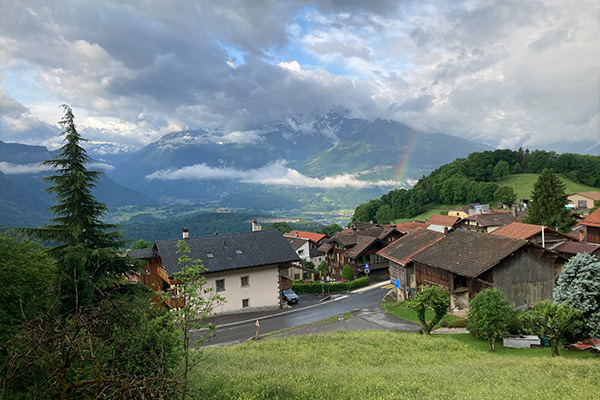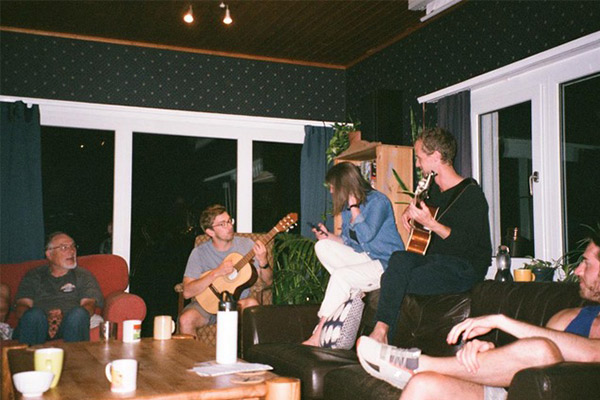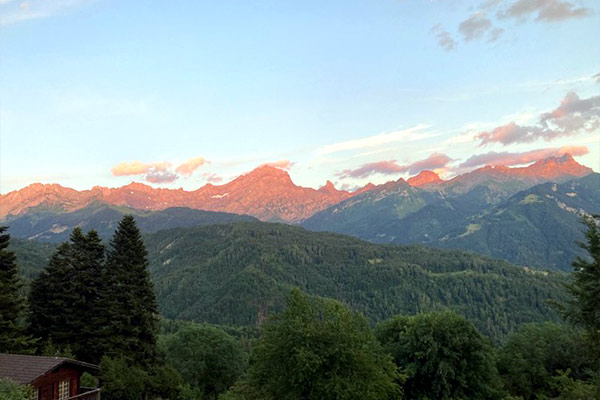Subtotal: $
Checkout
Leaving L’Abri
Hoping to grow closer to God, a young man learns some truths about himself and encounters some of the miracles of community during his time at L’Abri.
By A. J. Maruna
March 18, 2023
“The truly wide taste in reading is that which enables a man to find something for his needs on the sixpenny tray outside any secondhand bookshop. The truly wide taste in humanity will similarly find something to appreciate in the cross-section of humanity whom one has to meet every day. In my experience it is Affection that creates this taste, teaching us first to notice, then to endure, then to smile at, then to enjoy, and finally to appreciate, the people who ‘happen to be there.’ Made for us? Thank God, no. They are themselves, odder than you could have believed and worth far more than we guessed.”
—C. S. Lewis, The Four Loves
My time at L’Abri made me feel like a character in a play whose actions affected the plot but who was never actually in control. I did not choose which people would be there and which ones I would connect with. I did not choose the conversations I was a part of, the lessons I learned, the lectures I heard, the food I ate.
I lived and learned and participated in a life I was simultaneously responsible for and unable to control, and L’Abri was one more step on a path still obscured by the dark…
In 1955, Francis and Edith Schaeffer first opened the doors of L’Abri for people like me. L’Abri, which means shelter in French, began in the small village of Huémoz, less than two hours from Geneva, Switzerland, and overlooks the expansive Rhône Valley and the Alps. Eventually this ministry would grow beyond Switzerland, providing a place for people of all walks of life to ask honest questions and receive honest answers while living and working in a community.
In Christian circles, doubt can sometimes be treated like a highly infectious disease and the infected as people to be quarantined for fear of catching their spiritual germs. But L’Abri offers a place where you’re free to be sick out in the open, where your questions and issues and ailments are discussed and examined and prayed over. At L’Abri, honesty is seen less as a sickness and more as a strength because being honest means being human.
So, at the very least, I haven’t been alone with my struggles.
L’Abri attracts all kinds of characters too eccentric and interesting to be anything other than real, and despite being unified by a shared existential crisis, we are as diverse in our set of problems as we are in our talents.

View of the village of Huémoz, Switzerland, where L’Abri is located. Photograph by A. J. Maruna.
I could never have made up Danny, an American boy too intelligent for his own good, whose many self-described “rage walks” were an attempt to reconcile his spiritual turmoil with his conviction that he had a role to play in “reality’s great cosmic dance.” I also couldn’t have made up that this same person spends his free time making origami art, or that everything he makes is shockingly good.
I could never have made up Michael, a woodland conservationist from Northern Ireland, who has too many stories about elderly neighbors or the Queen’s cousin or romantic mishaps to include in one essay.
I could never have made up Adèle, a teenaged Swiss wrestler, who, when emotionally overwhelmed, would laugh hysterically until she cried. I remember sitting with her in a booth during dinner and watching her laugh and cry like an adorable escapee from some insane asylum.
“I just remembered,” she said smiling, tears streaming out from under her fogged glasses. “I’m leaving tomorrow.”
Saying goodbye to people who, only weeks ago, you didn’t even know is a normal occurrence at L’Abri, and the lessons that you learn from experiencing these lives are as varied as the people.
I learned to be patient and listen, to see those problems in myself that I saw most clearly in others, to see a little more of the nuance in the world and people.
This happened too many times to count.
Someone you found difficult opens up about their struggles and suddenly they burst into color. They become alive, and the label you gave them and the box you placed them in stand as indictments on you, not them. You are confronted with the possibility that a person you had so easily written off may, in fact, have stronger faith than you.
I learned that everyone has a story, and everyone’s story is different, and they all involve some measure of pain.
There is so much hiding behind these people’s eyes. I made a passive remark to a young woman with big blue eyes about how hard it is to trust God in this season of my life, and immediately her eyes began to glisten, she looked away, and I changed the subject. This is a group of people who have suffered, whose spiritual struggles can be summed up in the phrase, “I just don’t feel close to God.”
I think every honest Christian can relate.
I came to L’Abri wanting to have greater intimacy with God, to understand his role in my life in this painfully practical world, to take so many years of loneliness and selfishness and redeem them by pouring myself out to strangers. But I’m not sure I accomplished any of it. Instead I learned a few lessons about myself, about the depth of my pride and impatience, about the kind of home I want to have and open up to others, about the kind of work I do and do not want to do.
I learned to be patient and listen, to see those problems in myself that I saw most clearly in others, to see a little more of the nuance in the world and people.
But the issues I brought with me remain unresolved. How do you find any of the innumerable things you want? If L’Abri is incapable of answering these kinds of questions it’s because these are the practical matters that no one has answers to. How do you find your place in such an unfathomably big world when you are such an infinitely small part of it?
Invariably these questions turn desperate, and then they turn into prayers. Oh, God, why would you have given me a passion for something and no opportunity to use it? Why would you have made me with longings and no way of satisfying them? Abba, Father, what do you want from me?
In some ways your greatest fear has come true. Becoming a bit more aware of your proclivity for pride feels like an anemic victory when your bank account is drying up and you don’t know what to do or where to go.
You’ve had this wonderful experience, you’ve learned some lessons, gained some wisdom, and now you get to return home just as you always have.
It is a natural human desire to want lives that are anesthetized to pain, stories that are free from conflict, as if change could somehow occur any other way. It was good for me to be afflicted, the psalmist said, that I might learn your decrees. This is a humbling thing to confess, and it produces a humbling realization. It means you’re in a position to admit that if it’s been a season of unprecedented lostness then it’s also been a season of unprecedented change.
You have never learned so much about God and yourself and people in such a short span of time. You have never been so artistically validated, so spiritually challenged, so relationally alive. If the two go hand-in-hand, growing and confronting the unknown, then you can directly pinpoint the cause of so many years of stagnation, and you can confidently say that your next plunge into the unknown will be worth it if for no other reason than to simply see how God catches you.
It will be an actual exercise of faith and prayer, the exercising of a relationship that is predicated entirely on trust, not certainty. You’ve seen as much at L’Abri, an organization that has survived so many decades in much the same way.

Residents of L’Abri during one of their weekly art nights. Photograph by Emily Henegar. Used by permission.
A part of me will always be at L’Abri. The experiences I had were too meaningful not to try and preserve some remnant of the life I had, if only in that way we all long for an unrecapturable past…
I am looking at the mountains glowing bright red in the evening light as we gather together and listen to Cat and Ben and Evan perform a song for art night.
I am listening to Jono talk endlessly about the difficulties of sowing spiritual seeds in the parched soil of Australia, and I am watching the clock tick past midnight.
I am floating down the river Aare with four friends. The water is blue and quick, and when I go beneath the surface, the stones sing out with the quickness of the water.
I am laughing in my bed, and Michael and Will are laughing in theirs. I am laughing until tears are trickling down my face and my insides hurt, laughing at jokes and scenarios too embarrassing or strange to try and explain to anyone outside of our room.
I am hiking L’Argentine, and I turn the corner of the hill to see mountains so wide and tall and deep that no single photo can capture them. They draw out an audible gasp and then a word of awe. Clouds flow over the peaks just as they did in prehistoric times, and I watch them paint the rolling, green land with their lovely, slow-moving shadows.
I am sitting with Richard, the director of L’Abri, and am peppering him with all kinds of questions and spiritual complaints and unrequited longings, caught between my insatiable curiosity and my desire to catch him off-guard. But there is nothing he hasn’t heard before…
These are only a few moments, but they represent a summer-long tapestry of which I am only one particular thread. This is how life should be after all, because your individual part isn’t nearly as important as how it fits into a larger whole.
How that plays itself out, I can’t say. We live in the tension of a past we cannot return to and a future we cannot know, but the world is drawing us back, back to normality, back to life, and that means that we have to leave L’Abri.
I think I will always mourn the loss of the life that I lived there.

The Alps at sunset. Photograph by A. J. Maruna.
I will miss the mountains and the community, the workers and the friendships, the late nights and early mornings, but most of all I will miss being in a place where your personality is allowed to stretch its legs, to be free from that cramped interior it finds itself in – a place where you can be your silliest, most vulnerable, most artistic self without consequences, without fear, without trepidation, a place where loneliness, for once in your life, is truly a choice.
Now that it’s my turn to say goodbye I find myself thankful. I’m thankful for the friendships that have sprung fully formed from a soil cultivated decades ago, friendships I have done absolutely nothing to create or deserve. I’m thankful that people who come to L’Abri are free to think aloud and wrestle publicly with the contents of their hearts.
Soon it will just be a place where your friends have been, but when we’re all gone it will still be a place where people are, and that means, more importantly, it will be a place where God is too.
A goodbye suggests that God has been, in a sense, on the move in your life. A goodbye implies a hello, and a meaningful one at that, and one in which the who and when and where were utterly outside of your control.
It is a miracle that you find people in the world that you have an immediate connection with, an instant and inexplicable bond. It transcends geographical distances or cultural differences and unites our personalities and preferences by a distinctly spiritual thread. It is one of the great miracles of life that any of us have friends.
And it is a miracle to know and cherish and rest in the fact that, at least for a season, you truly weren’t alone.
Already a subscriber? Sign in
Try 3 months of unlimited access. Start your FREE TRIAL today. Cancel anytime.







Mary
Thanks for this. I'm hoping to go next summer although possibly to the English campus. Mid-life crisis as it were:-) Appreciate your honest thoughts on how it impacted you!
Catherine Hofmann
I read Francis and Edith Shaeffers books about faith and living and L’Abri. When I was a young mom and a new Christian in the 70s. So happy and thankful that it is thriving and growing ♥️ still. Enjoyed reading your essay!! ♥️Cathy
Patricia Ann Morwood
Thank you for explaining experiencing L'abri. I could almost feel it as if I had been there too.
Gregory Magruder
Well said AJ. I attended Southborough Laurie in the 1980s and Swiss Laurie during my sabbatical in 2012. You have perfectly described the ebb and flow of the people, the mountains, the intellectual and emotional stimulation. Friendships were formed, flaws uncovered, and future paths forged. Thank you for reminding me of the blessing of L'Abri.
Keri
I was at the Massachusetts L'Abri just for a week (I had a job and husband and toddler at home) but still mark it as a standout week where I came away changed.
Nancy Yuille
I arrived at Swiss L'Abri early in Jan.1970. I returned home in May and then returned in August 1971 as a "Helper/Worker" until 1973.The L'Abri Family has been a source of enduring friendships and much encouragement in my faith journey. May you find it the same as you continue in yours.